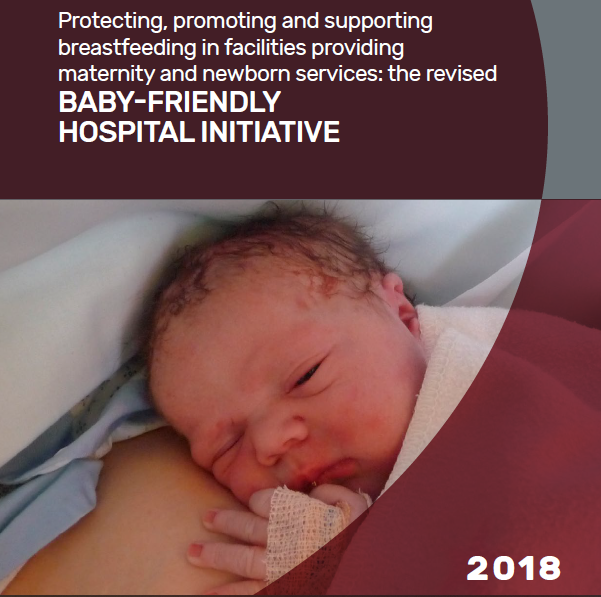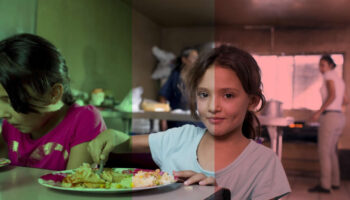World Health Organization and the United Nations Children’s Fund
The first few hours and days of a newborn’s life are a critical window for establishing lactation and for providing
mothers with the support they need to breastfeed successfully. Since 1991, the Baby-friendly Hospital Initiative (BFHI) has helped to motivate facilities providing maternity and newborn services worldwide to better support breastfeeding. Based on the Ten Steps to Successful Breastfeeding (the Ten Steps), the BFHI focuses on providing optimal clinical care for new mothers and their infants. There is substantial evidence that implementing the Ten Steps significantly improves breastfeeding rates.
The BFHI has been implemented in almost all countries in the world, with varying degrees of success. After more
than a quarter of a century, coverage at a global level remains low. As of 2017, only 10% of infants in the world
were born in a facility currently designated as “Baby-friendly”. Countries have found it difficult to sustain a BFHI
programme, with implementation often relying on specific individual and external resources. The programme has
characteristically been implemented as a vertical intervention focused on designating facilities that volunteer to take
part in the programme and can document their full adherence to the Ten Steps. Facilities may make changes in their
policies and procedures to obtain the designation, but these changes are not always sustainable, especially when there are no regular monitoring systems in place.
In 2015, the World Health Organization (WHO) and the United Nations Children’s Fund (UNICEF) began a process to
re-evaluate and reinvigorate the BFHI programme. Case-studies, key informant interviews, a global policy survey and literature reviews were conducted to better understand the status and impact of the initiative. Systematic literature reviews were commissioned to carefully examine the evidence for each of the Ten Steps. WHO convened a guideline development group to write the WHO guideline Protecting, promoting and supporting breastfeeding in facilities providing maternity and newborn services and an external review group to update the guidance on country- level implementation of the BFHI. The main concepts and outline of the updated implementation guidance were discussed extensively at the BFHI Congress in October 2016, involving approximately 300 participants from over 130 countries. The draft updated guidance document was disseminated through an online consultation in October 2017 and comments from over 300 respondents were considered in the final revisions of the document.
This updated implementation guidance is intended for all those who set policy for, or offer care to, pregnant women,
families and infants: governments; national managers of maternal and child health programmes in general, and of
breastfeeding- and BFHI-related programmes in particular; and health-facility managers at different levels (facility
directors, medical directors, chiefs of maternity and neonatal wards). The document presents the first revision of the
Ten Steps since 1989. The topic of each step is unchanged, but the wording of each one has been updated in line with the evidence-based guidelines and global public health policy. The steps are subdivided into (i) the institutional procedures necessary to ensure that care is delivered consistently and ethically (critical management procedures); and (ii) standards for individual care of mothers and infants (key clinical practices). Full application of the International Code of Marketing of Breast-milk Substitutes and relevant World Health Assembly Resolutions (the Code), as well as ongoing internal monitoring of adherence to the clinical practices, have been incorporated into step 1 on infant feeding policies.
The implementation guidance also recommends revisions to the national implementation of the BFHI, with an emphasis on scaling up to universal coverage and ensuring sustainability over time. The guidance focuses on integrating the programme more fully in the health-care system, to ensure that all facilities in a country implement the Ten Steps. Countries are called upon to fulfil nine key responsibilities through a national BFHI programme, including establishing or strengthening a national coordination body; integrating the Ten Steps into national policies and standards; ensuring the capacity of all health-care professionals; using external assessment to regularly evaluate adherence to the Ten Steps; incentivizing change; providing necessary technical assistance; monitoring implementation; continuously communicating and advocating; and identifying and allocating sufficient resources.
The BFHI focuses on protecting, promoting and supporting breastfeeding in facilities providing maternity and newborn services. It is understood that many other interventions are needed to ensure adequate support for breastfeeding, including in antenatal care, postpartum care, communities and workplaces, as well as adequate maternity protection and Code legislation. It is critical that the BFHI programme is integrated with all other aspects of breastfeeding protection, promotion and support.
By reinvigorating the BFHI and ensuring that all facilities adhere to evidence-based recommendations on maternity
and newborn care, breastfeeding rates can be substantially increased and the health of mothers and children
dramatically improved.







